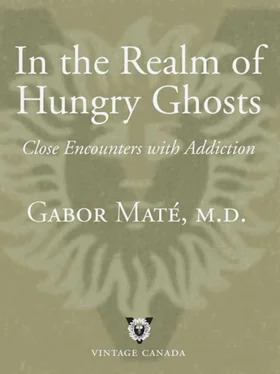It may be argued that, at least so far as work is concerned, what I call my addictions have benefited other people. Even if that were true, it still wouldn’t explain or justify addiction. The contributions I have made in a number of areas that I am passionate about could have been achieved without the addictive zeal that often drove me. There is no such thing as a good addiction. Everything a person can do is better done if there is no addictive attachment that pollutes it. For every addiction—no matter how benign or even laudable it seems from the outside—someone pays a price.
No human being is empty or deficient at the core, but many live as if they were and experience themselves primarily that way. Attempting to obliterate the sense of deficiency and emptiness that is a core state of any addict is like labouring to fill in a canyon with shovelfuls of dust. Energy devoted to such an endless and futile task is robbed from one’s psychological and spiritual growth, from genuinely soul-satisfying pursuits and from the ones we love.
Stephen Reid has written about the “darkness…the secret self-loathing that pools in the heart of every junkie.” 2The shame arises because indulging the addiction process, even if with an ostensibly harmless object, only deepens the vacuum where connection with the world and a healthy sense of self ought to arise. The shame is that of self-betrayal. The utter insatiability of this sense of deficient emptiness hit home for me when I was invited to speak at IdeaCity, an annual conference about ideas, scientific advances and culture in Toronto. For years I looked at the list of presenters with bitterness. I was envious and longed to be invited—a longing that arose from my neediness around being wanted and recognized. Finally, I was asked to participate. My ego was satisfied—or so I thought. Once in Toronto, no sooner had I begun to enjoy the program and to relish meeting so many open-minded and fascinating people than the relentlessly possessive and ever-hungry ego voice in my mind began to agitate: “ Some of these speakers have been here two or even three times. Will you be asked again? You SHOULD be asked again. …” I could only laugh. The ego can never get enough—it doesn’t even know the concept.
When I tell my Portland patients about my addictive behaviour and how it feels on the inside—the craving, the unbearable urgency, the relapses, the shame—they all nod their heads and laugh in recognition. Stephen Reid also knows what I’m talking about. “I’ve spent too much time on external things,” he says, “bouncing off other people…makes my teeth hurt, the work of pulling back from all those outside things and looking inside myself.” His voice trails off as he says this, and then he adds: “It has seemed to me at times that you can be present in your life only as a kid or when you’re on heroin.” A credo of discouragement and defeat that many of us share: a child may be completely in the present moment, but an adult can get there only with artificial assistance.

Stephen’s comment about his relentless focus on outside things touches upon the so-called addictive personality—or, to put it accurately, the addiction-prone personality. Is there such an entity? The answer is not a simple yes or no. No collection of personality traits will by themselves cause addiction, but some traits will make it much more likely that a person will succumb to the addiction process.
People are susceptible to the addiction process if they have a constant need to fill their minds or bodies with external sources of comfort, whether physical or emotional. That need expresses a failure of self-regulation —an inability to maintain a reasonably stable internal emotional atmosphere. No one is born with the capacity for self-regulation; as I’ve mentioned, the infant is completely dependent upon the parents to regulate his physical and psychological states. Self-regulation being a developmental achievement, we reach it only if the conditions for development are right. Some people never attain it; even in advanced adulthood they must rely on some external support to quell their discomfort and soothe their anxiety. They just cannot make themselves feel okay without such supports, whether they be chemicals or food or an excessive need for attention, approval or love. Or they seek to make their lives exciting by engaging in activities that trigger elation or a sense of risk. A person with inadequate self-regulation becomes dependent on “outside things” to lift his mood and even to calm himself if he experiences too much undirected internal energy. In my own case, I’ve binge-shopped CDs when I’ve felt down or restless or bored—but also when I’ve felt overly elated and didn’t know what to do with myself.
Impulse control is one aspect of self-regulation. Impulses rise up from the lower brain centres and are meant to be permitted or inhibited by the cerebral cortex. A salient trait of the addiction-prone personality is a poor hold over sudden feelings, urges and desires. Also characterizing the addiction-prone personality is the absence of differentiation. 3Differentiation is defined as “the ability to be in emotional contact with others yet still autonomous in one’s emotional functioning.” It’s the capacity to hold on to ourselves while interacting with others. The poorly differentiated person is easily overwhelmed by his emotions, “absorbs anxiety from others and generates considerable anxiety within himself.” 4
Lack of differentiation and impaired self-regulation reflect a lack of emotional maturity.
Psychological maturation is the development of a sense of self as separate from inner experience—a capacity entirely absent in the young child. The child has to learn that she is not identical with whatever feeling happens to be dominant in her at any particular moment. She can feel something without her actions being automatically dictated by that feeling. She can be aware of other, conflicting feelings or of thoughts, values and commitments that might run counter to the feeling of the moment. She can choose. In the addict this experience of “mixed feelings” is often lacking. Emotional processes rule the addict’s perspective: whatever she is feeling at the moment tends to define her view of the world and will control her actions.
The same applies in the realm of relationships: for maturation the child must become unique and separate from other individuals. She has to know her own mind and not be overwhelmed by the thoughts, perspectives or emotional states of others. The better differentiated she becomes, the more she is able to mix with others without losing her sense of self. The individuated, well-differentiated person can respond from an open acceptance of his own emotions, which are not tailored either to match someone else’s expectations or to resist them. He neither suppresses his emotions nor acts them out impulsively.
Dr. Michael Kerr, a psychiatrist in Washington, DC, and director of the Georgetown University Family Center, distinguishes between two types of differentiation: functional differentiation and basic differentiation, which, from the perspective of health and stress are worlds apart. Functional differentiation refers to a person’s ability to function based on external factors. The less basic differentiation a person has attained, the more prone he is to rely on relationships to maintain his emotional balance. When relationships fail to sustain such people, they may turn to addiction as the emotional crutch. Some of my Portland patients functioned reasonably well until, say, their marriages fell apart; then they spiralled rapidly into substance use. Even in the Downtown Eastside, their moods hit rock bottom or soar according to how they are doing with their current partners. They feel hurt easily and are quick to believe they are being rejected—and their level of drug use often hinges on what’s happening in their relationships. When one relationship ends, they may immediately plunge into another. They are often unable to engage in a process of recovery because their partner is unwilling to join them; they see the relationship as being more important than their own healthy self. Poor differentiation also keeps people in destructive relationships, which themselves take on an addictive quality.
Читать дальше













